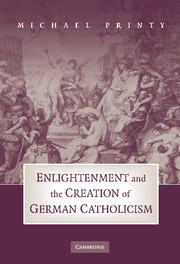Book contents
- Frontmatter
- Contents
- Acknowledgments
- 1 Introduction
- Part One PERFECT SOCIETIES: RETHINKING THE CHURCH AND THE STATE
- Part Two THE UNIVERSAL CHURCH AND THE UNIVERSAL CLASS
- 6 Catholic Enlightenment and the Search for a Bourgeois Catholicism
- 7 A Program for Reform
- 8 Pastors of Enlightenment: Reforming the Secular Clergy
- 9 Gallican Longings: Nation and Religion in the German Enlightenment
- 10 Conclusion
- Bibliography
- Index
8 - Pastors of Enlightenment: Reforming the Secular Clergy
Published online by Cambridge University Press: 02 July 2009
- Frontmatter
- Contents
- Acknowledgments
- 1 Introduction
- Part One PERFECT SOCIETIES: RETHINKING THE CHURCH AND THE STATE
- Part Two THE UNIVERSAL CHURCH AND THE UNIVERSAL CLASS
- 6 Catholic Enlightenment and the Search for a Bourgeois Catholicism
- 7 A Program for Reform
- 8 Pastors of Enlightenment: Reforming the Secular Clergy
- 9 Gallican Longings: Nation and Religion in the German Enlightenment
- 10 Conclusion
- Bibliography
- Index
Summary
Dissenting from a popular and strongly held opinion, I venture to suggest that when a nation deprives the Catholic clergy of the ownership of real estate and replaces the income drawn from it by fixed salaries, the nation is furthering the interests of the Holy See and the temporal power and these alone, and is also suppressing one of the chief elements of freedom within its borders. For a man who in respect of all that counts most in his spiritual life is subject to a foreign authority and is not allowed to have a family has only one possible link with the soil of the country in which he lives. Cut this link and he belongs nowhere in particular … though an excellent member of the Christian civitas, he is but an imperfect citizen in the mundane sense.
– Tocqueville, The Old Regime and the French RevolutionREFORMING THE CLERGY
The secular clergy was at the nexus of the rethinking of the church. Ideas and plans for the reformation of the clergy touched the heart of relations between the church and state. They were inseparable from questions of the structure of church hierarchy and were the canvas onto which reformers projected their visions of social reform.
Competing visions of the clergy and the type of religious practices, they should be supporting lurked behind the contest over the institutional apparatus of the church.
- Type
- Chapter
- Information
- Enlightenment and the Creation of German Catholicism , pp. 166 - 184Publisher: Cambridge University PressPrint publication year: 2009



